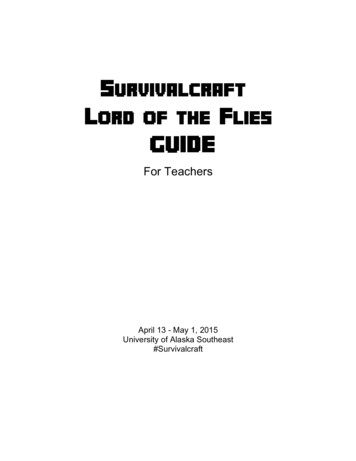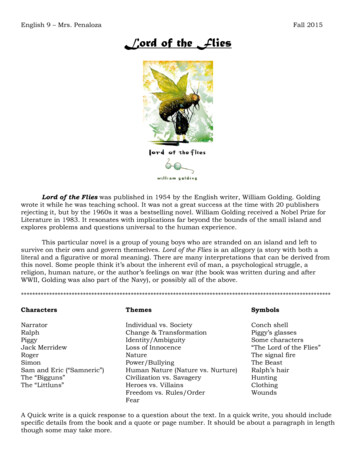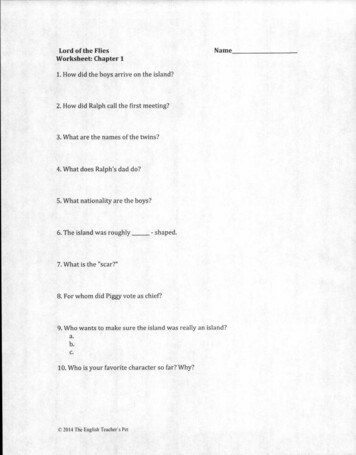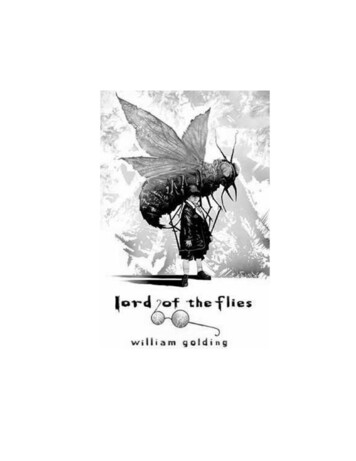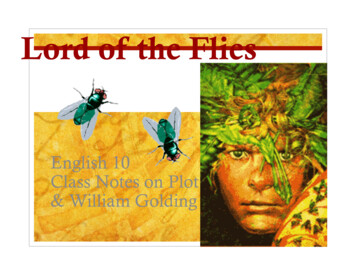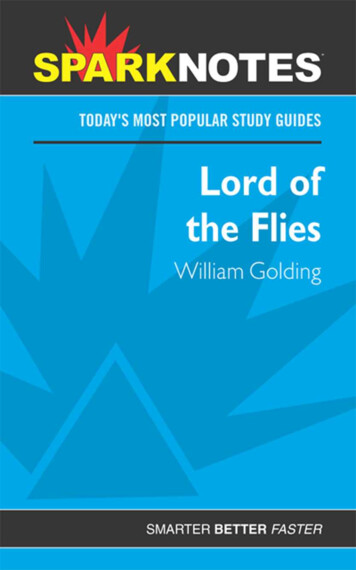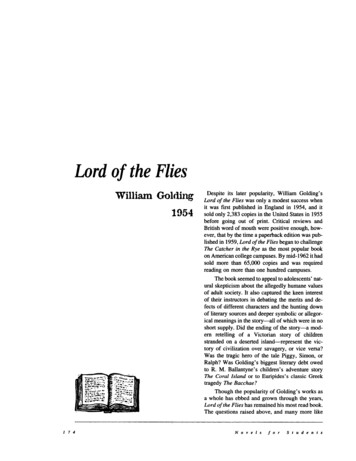
Transcription
Lord of the FliesWilliam Goldillg19541 7 4Despite its later popularity, William Golding'sLord of the Flies was only a modest success whenit was first published in England in 1954, and itsold only 2,383 copies in the United States in 1955before going out of print. Critical reviews andBritish word of mouth were positive enough, however, that by the time a paperback edition was published in 1959, Lord ofthe Flies began to challengeThe Catcher in the Rye as the most popular bookon American college campuses. By mid-1962 it hadsold more than 65,000 copies and was requiredreading on more than one hundred campuses.The book seemed to appeal to adolescents' natural skepticism about the allegedly humane valuesof adult society. It also captured the keen interestof their instructors in debating the merits and defects of different characters and the hunting downof literary sources and deeper symbolic or allegorical meanings in the story-all of which were in noshort supply. Did the ending of the story-a modem retelling of a Victorian story of childrenstranded on a deserted island-represent the victory of civilization over savagery, or vice versa?Was the tragic hero of the tale Piggy, Simon, orRalph? Was Golding's biggest literary debt owedto R. M. Ballantyne's children's adventure storyThe Coral Island or to Euripides's classic Greektragedy The Bacchae?Though the popularity of Golding's works asa whole has ebbed and grown through the years,Lord of the Flies has remained his most read book.The questions raised above, and many more likeN o v e l sf o rS t u d e n t s
L o r do ft h eF I i e sthem, have continued to fascinate readers. It is forthis reason, more than any other, that many critics consider Lord of the Flies a classic of ourtimes.KMWMTM.From an unknown schoolmaster in 1954, whenLord of the Flies was first published, William Golding became a major novelist over the next ten years,only to fall again into relative obscurity after thepublication of the generally well-received TheSpire in 1964. This second period of obscuritylasted until the end of the 1970s. The years 1979to 1982 were suddenly fruitful for Golding, and in1983 he was awarded the Nobel Prize in Literature.How does one account for a life filled with suchups and downs? There can be no one answer to thatquestion, except perhaps to note that Golding'smotto, "Nothing Twice," suggests a man with aninquiring mind who was not afraid to try many different approaches to his craft. He knew that whilesome of his efforts might fail, others would be allthe stronger for the attempt.Born in 1911, Golding was the son of an English schoolmaster, a many-talented man who believed strongly in science and rational thought.Golding often described his father's overwhelminginfluence on his life. The author graduated fromOxford University in 1935 and spent four years(later described by Golding as having been"wasted") writing, acting, and producing for asmall London theater. Golding himself became aschoolmaster for a year, after marrying Ann Brookfield in 1939 and before entering the British RoyalNavy in 1940.Golding had switched his major from scienceto English literature after two years in college-acrucial change that marked the beginning of Golding's disillusion with the rationalism of his father.The single event in Golding's life that most affectedhis writing of Lord ofthe Flies, however, was probably his service in World War II. Raised in the sheltered environment of a private English school,Golding was unprepared for the violence unleashedby the war. Joining the Navy, he was injured inan accident involving detonators early in the war,but later was given command of a small rocketlaunching craft. Golding was present at the sinkingof the Bismarck-the crown ship of the GermanNavy-and also took part in the D-Day landings inV o lu m e2William GoldingFrance in June 1944. He later described his experience in the war as one in which "one had one'snose rubbed in the human condition."After the war, Golding returned to teachingEnglish and philosophy at the same school wherehe had begun his teaching career. During the nextnine years, from 1945 until 1954, he wrote threenovels rejected for their derivative nature beforefinally getting the idea for Lord of the Flies. After reading a bedtime boys adventure story to hissmall children, Golding wondered out loud to hiswife whether it would be a good idea to write sucha story but to let the characters "behave as theyreally would." His wife thought that would be a"first class idea." With that encouragement, Golding found that writing the story, the ideas forwhich had been germinating in his mind for sometime, was simply a matter of getting it down onpaper.Golding went on to write ten other novels plusshorter fiction, plays, essays, and a travel book. Yetit is his first novel, Lord ofthe Flies, that made himfamous, and for which he will probably remain bestknown. Golding died of a heart attack in 1993.1 7 5
L o r do ft h eF I i e sOn the Island: Chapters 1-2William Golding sets his novel Lord of theFlies at a time when Europe is in the midst of nuclear destruction. A group of boys, being evacuated from England to Australia, crash lands on atropical island. No adults survive the crash, and thenovel is the story of the boys' descent into chaos,disorder, and evil.As the story opens, two boys emerge from thewreckage of a plane. The boys, Ralph and Piggy,begin exploring the island in hopes of finding othersurvivors. They find a conch shell, and Piggy instructs Ralph how to blow on it. When the otherboys hear the conch, they gather. The last boys toappear are the choirboys, led by Jack Merridew.Once assembled, the boys decide they need a chiefand elect Ralph. Ralph decides that the choir willremain intact under the leadership of Jack, whosays they will be hunters.Jack, Ralph, and Simon go to explore the island and find a pig trapped in vines. Jack draws hisknife, but is unable to actually kill the pig. Theyvow, however, to kill the pig the next time. Whenthe three return, they hold a meeting. The conchbecomes a symbol of authority: whoever has theconch has the right to speak. Jack and Ralph explain to the others what they have found. Jack continues his preoccupation with his knife. The boywith the clearest understanding of their situation isPiggy. He tells them they are on an island, that noone knows where they are, and that they are likelyto be on the island for a very long time withoutadults. Ralph replies, "This is our island. It's a goodisland. Until the grownups come to fetch us we'llhave fun." One of the "littluns," the group ofyoungest boys, says that he is afraid of the"beastie." The "biguns" try to dissuade him, saying there are no beasties on the island. However, itis at this moment that Jack asserts himself againstRalph, saying that if there were a beastie, he wouldkill it.Discussion returns to the possibility of rescue.Ralph says that rescue depends on making a fire sothat ships at sea could see the smoke. The boys getoverly excited, with Jack as the ringleader, and allbut Piggy and Ralph rush off to the top of the mountain to build a fire. They forget about the conch andthe system of rules they have just made. At the topof the mountain, Ralph uses Piggy's glasses to lightthe fire. They are careless and set fire to the mountain. Piggy accuses them of "acting like kids." He1 7 6reminds the older boys of their responsibility to theyounger boys. At this moment they realize that oneof the littluns is missing.The Beast: Chapters 3-11The story resumes days later with Simon andRalph trying to build shelters on the shore. Jack isaway hunting. When he returns, there is antagonism between Ralph and Jack. Jack is beginning toforget about rescue and is growing tired of the responsibility of keeping the fire going, a task forwhich he has volunteered his choir. The growingseparation between the boys is marked by Ralph'sinsistence on the importance of shelter and Jack'son the hunting of meat.In the next chapter, Golding describes therhythm of life on the island. By this point, Jack hasbegun to paint his face with mud and charcoal whenhe hunts. At a crucial moment, the fire goes out,just as Ralph spots a ship in the distance. In themidst of Ralph's distress, the hunters return with adead pig. In the ensuing melee, one of the lensesin Piggy's glasses gets broken.Ralph calls an assembly in order to reassert therules. The littluns bring up their fear of the beastieyet again, saying that it comes from the sea. Simontries to suggest that the only beast on the island isin themselves; however, no one listens. Ralph onceagain calls for the rules. Jack, however, plays tothe fear of the boys, and says, "Bollocks to therules! We're strong-we hunt! If there's a beast,we'll hunt it down! We close in and beat and beatand beat-!" The meeting ends in chaos. Ralph,discouraged, talks with Piggy and Simon abouttheir need for adults. "If only they could get a message to us. If only they could send us somethinggrownup . a sign or something."The sign that appears, however, comes whenall the boys are asleep. High overhead rages an airbattle and a dead parachutist falls to the island.When the boys hear the sound of the parachute,they are sure it is the beast. Jack, Ralph, and Simon go in search. Climbing to the top of the mountain, they see "a creature that bulged." They do notrecognize the figure as a dead parachutist, tangledin his ropes, and swaying in the wind.When the boys return to the littluns and Piggyat the shelters, Jack calls an assembly. He callsRalph a coward and urges the boys to vote againstRalph. They will not, and Jack leaves. Ralph triesto reorganize the group, but notices that graduallymost of the biguns sneak off after Jack. The sceneshifts to Jack, talking to his hunters. They go offN o v e l sf o rS t u d e n t s
L o r do ft h eF I i e son a hunt in which they kill a sow, gruesomely andcruelly. They cut off the pig's head and mount iton a stick in sacrifice to the beast. Meanwhile, Simon wanders into the woods in search of the beast.He finds the head, now called in the text "The Lordof the Flies." Simon feels a seizure coming on ashe hallucinates a conversation with the head:Simon's head was tilted slightly up. His eyes couldnot break away and the Lord of the Flies hung inspace before him."What are you doing out here all alone? Aren't youafraid of me?"Simon shook."There isn't anyone to help you. Only me. And I'mthe Beast."Simon's mouth labored, brought forth audible words."Pig's head on a stick.""Fancy thinking the Beast was something you couldhunt and kill!" said the head. For a moment or twothe forest and all the other dimly appreciated placesechoed with the parody of laughter. "You knewdidn't you? I'm part of you? Close, close, close! I'mthe reason why it's no go? Why things are what theyare?"Simon falls into unconsciousness. When heawakens, he finds the decomposed body of theparachutist, and realizes that this is what the boysthink is the beast. He gently frees the dead manfrom his ropes.Back at the shelters, Ralph and Piggy are theonly ones left. The two go to see Jack and thehunters, and they find a big party. At the height ofthe party, a storm breaks and Simon arrives to tellthem that there is no beast. In a frenzy, they killSimon. Later, Ralph, Piggy, Sam, and Eric arealone on the beach. All the boys agree that they leftthe dance early and that they did not see anything.The four boys try to keep the fire going, but theycannot. Jack's hunters attack the boys and stealPiggy's glasses so that they have the power of fire.Enraged, Ralph and Piggy go to retrieve the glasses.There is a fight, and Roger, the most vicious of thehunters, launches a rock at Piggy, knocking theconch from his hands, and sending him some fortyfeet to the rocks in the sea below.The Rescue: Chapter 12The scene shifts to Ralph, alone, hiding fromthe rest of the boys who are hunting him. The language used to describe the boys has shifted: theyare now "savages," and "the tribe." Ralph is utterlyalone, trying to plan his own survival. He finds theLord of the Flies, and hits the skull off the stick.V o I u m e2From the film Lord of the Flies, 1963.Ralph sees Sam and Eric serving as lookouts forthe tribe and approaches them carefully. They warnhim off, saying that they've been forced to participate with the hunters. When Ralph asks what thetribe plans on doing when they capture him, thetwins will only talk about Roger's ferocity. Theystate obliquely, "Roger sharpened a stick at bothends."Ralph tells the twins where he will hide; butsoon the twins are forced to reveal this location andRalph is cornered. However, the tribe has onceagain set the island on fire, and Ralph is able tocreep away under the cover of smoke. Back on thebeach, Ralph finds himself once again pursued. Atthe moment that the savages are about to capturehim, an adult naval officer appears. Suddenly, withrescue at hand, the savages once again become little boys and they begin to cry. The officer cannotseem to understand what has happened on the island. "Fun and gamnes," he says, unconsciouslyechoing Ralph's words from the opening chapter.Ralph breaks down and sobs, mourning Simon andmourning Piggy. In the final line of the book, Golding reminds the reader that although adults have arrived, the rescue is a faulty one. The officer looksout to sea at his "trim cruiser in the distance." Theworld, after all, is still at war.1 7 7
L o r do ft h eF I i e sBillLike Maurice, Bill is initially confused by theclash of values among the boys. At first he seemsseduced by Jack's painted face into joining thehunters in their anonymity; yet he then turns fearful and runs away. Eventually, however, Bill imagines group hunting and "being savages" as "jollygood fun" and thus a way of banishing these fears.He tries to convince Ralph's group to accept Jack'sinvitation to the feast, thinking that Jack is less fearful than Ralph about going into the jungle to hunt.Soon he has defected to Jack's group and is seenpainted like a savage and stalking Ralph.EricSee SamnericHenryHenry is the biggest littlun and a relative ofthe littlun with the mulberry-marked face who disappears after the first big fire. Henry is the objectof Roger's seemingly innocent game of throwingstones. Later, Henry defects to Jack's camp and ispart of the raiding party that steals fire from Ralphand Piggy.JohnnyAlong with Percival, Johnny is the smallest ofthe littluns. He is described as "well built, with fairhair and a natural belligerence," which he soonshows by throwing sand in Percival's face. Later,Johnny is shown crying when he thinks Eric maybe bleeding from his encounter with Jack's firestealers.The littlun with the mulberry-markedfaceOtherwise unidentified except as a distant relative of Henry, this littlun was noticed immediatelyafter the boys came on the island; he is the first boyto mention seeing a "snake-thing," a "beastie [who]came in the dark." He is not seen after the fire gotout of control. He is therefore the focus of muchanxiety, especially among Ralph's group, whichhad tried to make a special point of looking afterthe littluns.Percival Wemys MadisonPercival Wemys Madison, of the Vicarage,Harcourt St. Anthony, Hants, as he has been taughtto introduce himself, is "mouse-colored and had notbeen very attractive even to his mother." Along* 7 8with Johnny, Percival is the smallest littlun. WhenRalph and Piggy are trying to seek a rational explanation for Phil's dream of having seen andfought with "twisty things in the trees," they callon Percival as someone who was supposed to havebeen up that night and who might have been mistaken for the fearful thing that has so terrorized thelittluns. But Percival's mere recitation of his nameand address is enough to set off sad memories ofhis former life. His wails, along with his speculation that the beast comes from the sea, soon set offthe other littluns on similar crying jags.MauriceOne of the "biguns," he is next in size to Jackamong the choir boys. Like most of the boys, he isa mixture of potentially good and bad traits. Whichtraits are developed depends on how strong the callof society and law is over the powers of darknessand savagery. In the beginning Maurice is helpfulby suggesting that the boys use green branches onthe fire to make smoke. He also makes the "littluns" forget their sorrow by pretending to fall offthe twister log and making them laugh. Like Piggy,Maurice wants to believe that the world is a scientific place where human fears can be explained andneeds can be met. Yet Maurice, who "of all theboys . was the most at home" on the island, isstill fearful that "we don't know [about the beast],do we? Not certainly, I mean." Giving in to hisfears, Maurice joins Roger in asserting his powerby kicking over the littluns' sand castles. He alsosuggests adding a drum to the mock pig-killing ritual. Maurice's capitulation to his repressive leanings is complete when he defects to Jack and helpshim steal fire from Piggy and Ralph.Jack MerridewJack would have preferred to be called Merridew, his last name, rather than a "kid name." Thisattitude may suggest the "simple arrogance" thatcauses Jack to propose himself for chief. After all,he exclaims, "I'm chapter chorister and head boy."(The rough American equivalents of these positionsmight be president of the glee club and head of thestudent council.) It's true that Jack has the advantage of being tall; his direction of the choir is another sign of an "obvious leader." As a political animal, however, Jack recognizes that choirconducting won't get him far on a deserted island.His decision to turn the choir into a group of hunterswith himself as leader shows that he can be a wilystrategist. In other ways, however, Jack is carelessand destructive, as when he accidentally steps onN o v e I sf o rS t u d e n t s
L o r dPiggy's glasses and breaks a lens. Similarly, Jackbecomes so fixated with hunting that he neglectsthe fire, which goes out before the boys can signala passing ship. Nevertheless, Jack is successful indaring Ralph to come with him to hunt the mysterious beast when darkness is falling. On that huntJack and Ralph, joined by Roger, perceive throughthe falling darkness the dim, shrouded figure of thedead parachutist-an image of the adult world thatsuggests the destruction of the rational society envisioned by Ralph and Piggy.As Ralph's civilized world disintegrates,Jack's savage society becomes more distinct andpowerful. Jack separates his group from Ralph'swhen the group fails to dethrone Ralph and recognize Jack as leader. Then Jack sets about wooingaway the other boys to his group. One way is byinviting everyone to a pig roast. Another is bypainting his hunters' bodies and masking theirfaces, thus turning them into an anonymous mobof fighters who can wound and kill without fear ofbeing singled out as guilty. Significantly, it is Jackwho is the first of the older boys to see the possibility of the beast's existence, and ultimately theways to use the fear of the beast to his advantage:as a motivation for hunting, and as a means of keeping the littluns under his control. When Simonseeks to expose the beast as just a "dead man on ahill," he is killed by Jack's group.With Jack's successful theft of Piggy's lastglass lens, the hunters' raid on Ralph and Piggy'sfire, the capture and defection of Sam and Eric, andfinally Piggy's death, as engineered by Jack andRoger, the "savages"' power is almost absolute.Only the intervention of adult society, representedby the British captain, is able to save Ralph frombeing killed and to reduce Jack to embarrassed silence at his failure to harness the powers of evil.PhilOne of the more self-confident littluns, Philstraightforwardly describes his dream of the "twistythings" when requested by Piggy.PiggyPiggy is an intelligent and rational boy whoseexcess weight and asthma often make him the buttof the others' jokes. Yet because of his scientificapproach to problems, Piggy is a voice of reasonwithout whom Ralph's leadership would have beenundermined far sooner. It is Piggy who not onlyrecognizes the significance of the conch but whosespectacles enable Ralph to start the fire, whosesmoke is their only chance of being saved. It isV o I u m e2o ft h eF I i e sMediaAdaptations* Lord of the Flies enjoys the unusual status ofbeing one of the few serious contemporary novels to have been made into a movie twice. Thefirst, directed by Peter Brook in 1963 with anall-English cast, as has been described as "compelling," but was only moderately successful atthe box office. Available from Home VisionCinema and Fusion Video.* The remake in 1990 featured an American castand was directed by Harry Hook. While wellphotographed and "visceral," with R-rated content, it is generally regarded as inferior toBrooks's version. Available from ColumbiaTristar Home Video, The Video Catalog, andNew Line Home Video.* An 89-minute sound recording on cassette (JRH109), book, and study guide, produced in 1984and featuring excerpts from the novel, are available from the Listening Library, Old Greenwich,CT.Piggy who realizes that building the shelters is atleast as important for their long-term survival askeeping the fire going. It is Piggy whose understanding of the depths of Jack's hatred for Ralphforces Ralph to confront his despair at theirprospects for getting along. And it is Piggy whomakes the brilliant, however simple, suggestionthat the fire be moved down to the beach away fromthe "beast from air."For all his intellectual powers, however, Piggyis basically ineffectual without Ralph. Piggy is aman of thought, not of action, and he is physicallyweak because of his asthma. Without his spectacles, he is blind and helpless. After Jack has broken one lens from his glasses and stolen the other,Piggy is doomed in a society where irrational fearsand physical strength are more respected than science, law, and dialogue. It is significant that Piggyand the conch are both destroyed at the same timeby a huge rock rolled down a cliff by Roger, who1 7 9
L o r do ft h eF I i e shas been freed by Jack from the "taboo of the oldlife . the protection of parents and school and policemen and the law" to unleash his savage instincts. Of all the children, Piggy is the most adultin his appearance, behavior, and beliefs. His thinning hair, which never seems to grow, and his frequent appeals to "what grownups would do" suggest his maturity and wisdom. In the closing linesof the book, Ralph weeps not only for "the end ofinnocence, the darkness of man's heart," but for"the fall through the air of the true, wise friendcalled Piggy."RalphThe fair-haired, tall, handsome Ralph is an obvious choice to lead the band of children strandedon the island. He has a "directness" in his mannerthat the narrator calls a sign of "genuine leadership." As E. M. Forster describes Ralph in an introduction to one of novel's editions, he is "sunnyand decent, sensible and considerate." He seems tobe genuinely interested in the welfare of the entiregroup and can get along with all kinds of people.Perhaps he gets his sense of natural authority fromhis father, a commander in the Navy. He also hasabove-average powers of observation. He is thefirst to see the conch shell buried in the sand,though it is significant that it is Piggy who pointsout how it can be used as a signaling device.In fact, Ralph is far from the ideal leader, andcertainly far from the idealized Ralph in The CoralIsland, R. M. Ballantyne's romantic children'sstory for which Golding intended his book to be areality check. Ralph lacks the charisma and strategic skills to get the other boys to recognize whatthe conch represents-order, authority, dialogue,democracy. These are the qualities that are necessary if the group is to keep its signal fire going longenough to attract a passing ship. Golding oftennotes the "shutter" or cloud that sometimes comesover Ralph's mind when he is addressing the groupand that prevents him from finding the right wordto get their attention or galvanize them to action.This cloud of imperfection makes Ralph a kind ofeveryman with whom we can each identify, but itcontributes to the gradual descent of the boys intoa savagery to which Ralph himself succumbs bythe end of the story.RobertLike Simon and Maurice, Robert is one of themedium-sized boys on the lower end of the biguns'spectrum. In the stripped-down world of the islandwhere the physical assumes more weight, Robert1 8 0finds his niche guarding Castle Rock. Robert ismore comfortable taking orders than giving them.The one time he takes any initiative, pretending tobe the pig in a ritual game, he is quickly reducedto a sniveling child. He also serves with Jack andMaurice on the committee that welcomes Ralph'sgroup to Jack's feast.RogerJust as Piggy represents Ralph's best quality,his attempts to act mature, so Roger stands forJack's worst characteristic, his lust for power overliving things. Roger is first introduced as one of thebiguns who "kept to himself with an inner intensity of avoidance and secrecy." While Piggy thinksabout ways to be rescued, Roger is "gloomily" pessimistic about the group's chances. Acting on hisdarker impulses, at first in small ways, he knocksover Percival and Johnny's sand castles. Then hethrows stones at Henry, only missing because hisarm "was conditioned by a civilization that knewnothing of him and was in ruins." Once he seeshow Jack's "dazzle paint" created a mask that "liberated him from shame and self-consciousness,"however, it is only a matter of time before Rogercomes under Jack's power. First we see him, alongwith Ralph and the rest, participate in the mock pigkill in celebration of the successful hunt. Then, notlong after Jack secedes from the group, Roger follows him and is soon hunting pigs and offering tohelp Jack steal fire from Ralph's group. Thoughpart of Roger still questions the irresponsibility ofsome of Jack's actions, like beating Wilfred, henevertheless goes along with them. It is Roger who,"with a sense of delirious abandonment," finally releases the boulder from Castle Rock that kills Piggyand destroys the conch. And it is Roger who,"wielding a nameless authority," moves to detainSam and Eric.SamSee SamnericSamnericAs twins, the two always act together and indeed are often called Samneric as one unit. In thebeginning Sam and Eric are especially helpful toRalph, rekindling the fire on top of the mountainafter it almost goes out. Even after being scared bythe "beast from air," the twins do not desert Ralph,as Maurice and Roger do; instead the twins go withPiggy to gather fruit for their own feast. After attending Jack's pig roast, Sam and Eric return toRalph and Piggy's shelters, the last "biguns" to reN o v e I sf o rS t u d e n t s
L o r dmain loyal, though none will admit to the other thatthey were in any way involved in Simon's death.Finally Sam and Eric are captured by Jack's groupwhile accompanying Piggy and Ralph to demandthat Jack return Piggy's glasses. In the ensuing confrontation, Ralph attacks Jack and runs into the jungle, where his presence is then betrayed by thetwins, who fear for their lives.t h eF I i e shold on them. Yet the incident marks an importantturning point in the story, for it is the first time thatthe boys have deliberately killed one of their own.Good and EvilSimonPerhaps the most symbolic character in thestory, Simon represents the religious prophet orseer who is sensitive and inarticulate yet who, ofall the boys, perhaps sees reality most clearly. Simon's special powers are signaled early in the storywhen, even though he is not one of the bigger boys,he is chosen by Ralph to join him and Jack to explore the island. Among all the boys, it is Simonwhose behavior is perhaps the most exemplary during the first part of the story. He is Ralph's faithful helper in building the shelters. Simon alone recognizes that "maybe [the beast is] only us" or justa "pig's head on a stick." Simon, for all his sensitivity and fears, knows that the only way to dealwith fear is to face it. When no one else wants toclimb back up the mountain after seeing the "beastfrom air," it is Simon who proposes just such aclimb. "What else is there to do?" he reasons. Andeven after Simon imagines the beast telling him,with the "infinite cynicism of adult life," that"everything was a bad business," he answers, "Iknow that." Ralph's vision of how things are is alltoo-human and clouded compared to Simon's,though Simon must periodically retreat to the candle-budded trees in the forest to restore and maintain this clearsightedness.Yet even Simon faints with weakness and disgust after seeing the beast and imagining it saying,"You knew, didn't you? I'm part of you? . I'mthe reason why it's no go? Why things are whatthey are?" When confronted with the realizationthat he is isolated and cut off from the others in hisspecial knowledge, and just as afraid to die as anyof them, Simon begins to lose the vision that hadmade him a potential savior of the group.What began as a ritual and make-believekilling of the pig as a way of celebrating a goodhunt now becomes a real ritual murder. Simon, inan attempt to tell the others about his discovery ofthe "man on the hill," accidentally stumbles into aring of littluns and is killed in the confusion. Theshame that Ralph, Piggy, Sam, and Eric all feel theday after Simon's death, despite their attempts toignore it, show that civilized values still have someV o I u m eo f2During their abandonment on the island,Ralph, Piggy, Simon, and many of the other boysshow elements of good in their characters. Ralph'scalm "stillness," and his attentiveness to others'needs, make him a potentially good person. Goodmay be defined here as something just, virtuous, orkind that conforms to the moral order of the universe. Piggy's knowledge and belief in the powerof science and ra
Lord of the Flies has remained his most read book. The questions raised above, and many more like 1 7 4 N o v e l s f o r S t u d e n t s. L o r d o f t h e F I i e s them, have continued to fascinate readers. It is for this reason, more than any other, that many

